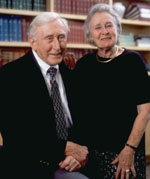Happy 30th birthday, Storm Eye
Institute
by
Heather WoolwinePublic Relations
Thirty years ago, the Storm Eye Institute opened its doors as the state hub for patient care, teaching, and research in ophthalmology. A first-year medical student at MUSC during that year, 1976, M. Edward Wilson, M.D., SEI director and Ophthalmology chairman, gazed at the building. “I kept wondering how in the world they were going to fill all five floors with just eyes,” he said with a laugh. “It was so innovative for that time, especially housing patient operating rooms and a wet lab all in one building. It’s pretty amazing how far we’ve come.”
Once a fledgling institute named in honor of donor Albert Florens Storm, the current SEI stands with views of a new bridge, and soon, a new MUSC hospital.
 Much has been
accomplished with Storm Eye Institute outreach, thanks to Theodora
“Teddy” Feldberg and the late Stanley Feldberg.
Much has been
accomplished with Storm Eye Institute outreach, thanks to Theodora
“Teddy” Feldberg and the late Stanley Feldberg.In 30 years, SEI grew to a well-established national leadership role in many areas. Most notable among them is through the sustained expertise of William Valloton, M.D., SEI’s first chairman, David Apple, M.D., former chairman, and now Kerry Solomon, M.D., Magill Laser Center director in cataract and lens implant surgery, and Wilson.
Numerous advances in research involving retinal disease came from the SEI, as this major aspect of basic science saw SEI researchers and faculty further retinal knowledge concerning genetics, vascular development, and neuroscience.
And with the devotion of its faculty, staff and scientists, SEI residency teaching grew from a small regional training ground to a well-respected and sought-after national ophthalmology program that now receives applications as diverse as any other institution in the country.
 SEI's Dr. Richard
Saunders, pediatric ophthalmologist, examines a pediatric patient in
clinic.
SEI's Dr. Richard
Saunders, pediatric ophthalmologist, examines a pediatric patient in
clinic.SEI will honor its mission of patient care, teaching, and research with a vast array of events, screenings, and public awareness campaigns during the entire calendar year of 2006. These events, dedicated to celebrating 30 years of excellence in patient care, teaching and research, were designed to not just promote SEI’s services and technologic advances, but also to focus on patient and community education.
“We’ve invested a lot of time into some very well-done public service announcements, we’ll be hosting a large, national meeting for the National Eye Institute for VISION Public Information Network in March, and we’ll continue to offer free screenings to help those patients who need it most,” Wilson said.
SEI will also host a ceremony to update its donor wall on the first floor of the Institute and will nominate three SEI professors to endowed chairs separate from the endowed chairs earmarked through state lottery funds. “We’re very hopeful that we’ll be able to gain final approval to fill those chairs through funds in the Health Sciences Foundation in 2006,” Wilson said.
As with any anniversary, the family at SEI must also look to the future while reflecting on their past. “We are really focusing on multi-subspecialty expertise to continue to build and improve upon our patient satisfaction,” Wilson said. “We have an emphasis on multidisciplinary research growth and innovation through clinical trials. We are now collaborating with researchers across campus to understand how vision is affected by numerous diseases, syndromes, and complications, in addition to our own basic science research in bioengineering, glaucoma, and retinal diseases. There is a huge amount of overlap in vision research with cancer, neuroscience and diabetes research.”
 The Magill Laser
Center and SEI satellite office in Mount Pleasant are two examples of
SEI's growth in the last 30 years.
The Magill Laser
Center and SEI satellite office in Mount Pleasant are two examples of
SEI's growth in the last 30 years. The SEI also participates in international and other outreach efforts, including satellite offices in Mount Pleasant and a new office opening later this month in Goose Creek.
No longer that first-year medical student, Wilson still maintains an enthusiasm and drive akin to that awe-struck young man who wondered how in the world MUSC would fill a building with just eyes.
Now we all know.
Friday, Feb. 10, 2006
Catalyst Online is published weekly,
updated
as needed and improved from time to time by the MUSC Office of Public
Relations
for the faculty, employees and students of the Medical University of
South
Carolina. Catalyst Online editor, Kim Draughn, can be reached at
792-4107
or by email, catalyst@musc.edu. Editorial copy can be submitted to
Catalyst
Online and to The Catalyst in print by fax, 792-6723, or by email to
catalyst@musc.edu. To place an ad in The Catalyst hardcopy, call
Community
Press at 849-1778, ext. 201.